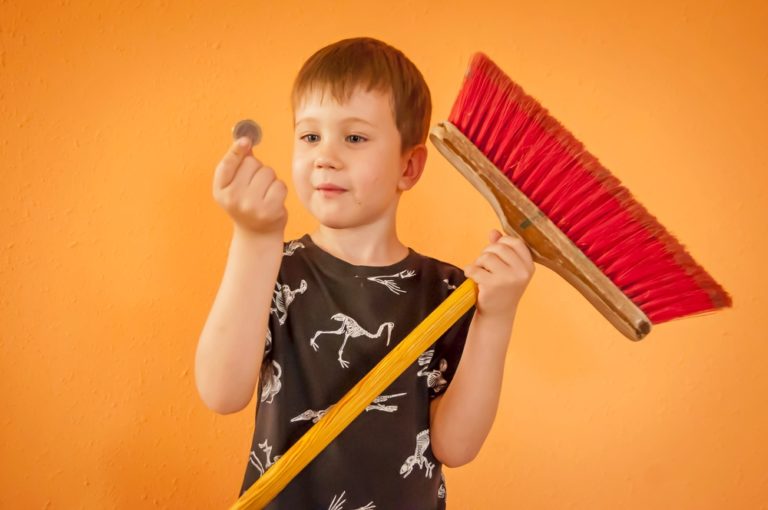
Family Life
- SINGAPORE
Should Children Be Paid To Do Household Chores?
The Pros And Cons Of Linking Money To Household Chores + Alternative Options

Having your children be involved with the upkeep of your home teaches them valuable lessons and independence. As your children get older, you might request them to do some chores around the house, other than cleaning their own room. Many parents will contemplate whether children should be rewarded or paid for the household chores. Unfortunately, there is no easy answer.
There are always pros and cons when giving an allowance to a child. Some parents will argue that children should be rewarded for their chores; others claim that helping around the house is expected of every family member. Whichever side you agree with, the point of an allowance is to teach your children money management skills, and the point of chores is to teach life skills for when they move out. We’ll dive further into the pros and cons of linking money to chores and also top tips on alternative ways to reward your kids for doing chores.
-

THE BENEFITS OF KIDS DOING HOUSEHOLD CHORES:
Why Household Chores Are Beneficial For ChildrenKids love to play! And parents want their kids to have the happiest childhoods. But the time eventually comes when it becomes necessary for kids to learn life skills. So let’s dive into a whole new kind of homework!
There are many benefits to teaching your children to do household chores and eventually giving them individual tasks to help around the house. Here are some of the top reasons:
- Family Bonding: Chores can create a special time between parent and child. Young children will receive a confidence boost by helping out, and grumpy teenagers can open up over shared household chores.
- Teamwork: Household chores teach children about teamwork and accountability for the other family members.
- Life Skills: Cooking, laundry, deep cleaning are key skills for when they move out of the house and they will be grateful to possess these skills when they are on their own.
- Responsibility & Self-Reliance: Assigning your children regular chores that affect them personally, such as doing their own laundry or making their own lunch, will aid them in becoming self-reliant and responsible.
- Respect: Children will learn to respect all the things that need to be done in the house because they are part of the 'family team' responsible for it. They'll become more aware of their mess since it's their responsibility to clean it up.
-

HOW TO MOTIVATE YOUR CHILDREN TO DO HOUSEHOLD CHORES?
Inspiring Your Children To Partake In Household ChoresMotivating your children to do their chores can be an exhausting task, but here are some essential tips on getting your kids to do chores with minimum objections:
- Have a family discussion, and instead of using vocab like chores and jobs, use motivational language, like family contributions or family roles.
- Create a structure for chores and set certain rules. For example, have them make the bed before they come down for breakfast, no games until the dishes are done. This way, children learn responsibilities and feel rewarded when they help out.
- Set time limits, this will help motivate your child and you can use it as an incentive. For example, "you can stay up another 15 minutes past bedtime if you finish the dishes in 20".
- Don't use chores as a punishment, because you want children to learn that a chore is an expected responsibility as a family member.
-

THE PROS AND CONS OF LINKING MONEY TO CHORES:
Should Children Be Paid To Do Household Chores?Many parents will wrestle with the question of whether they should pay their children to do household chores. The experts will argue that linking money to chores may have an adverse effect.
Pros:
If you choose the earn-money-for-chores option, your child will see a direct connection between effort and money. And if chores are not completed, then there will be no allowance.
Cons:
Alfie Kohn, who wrote Unconditional Parenting: Moving from Rewards and Punishments to Love and Reason, said that "the more that people are rewarded for doing something, the more likely they are to lose interest in whatever they had to do to get the reward." Various other studies also claim that children will feel more like contributing family members if they don't receive payment for doing chores.
-

THE HYBRID METHOD:
Should Children Be Paid To Do Household Chores?Many parents adopt the hybrid method. This is when children are expected to be contributing family members, but they can earn additional allowance when tackling larger chores.
If your child is receiving an allowance, it will usually not be tied to their household chores when adopting the hybrid method. Allowing them to make a little extra for doing larger tasks could give them an entrepreneurial outlook, as they will need to negotiate how much they think they should earn for each task.
-

ALTERNATIVE REWARDS:
Ways To Reward Your Child For Doing Household ChoresThere are some parents who do not want to link money to chores; but wish to reward their children as an incentive. We have listed some great alternative reward options below:
- Stay up past bedtime: No matter what age, every child wants to stay up later. It's a great way to motivate your kid to do a household chore!
- A new app every month: Kids and teens love apps, and a good reward system would be a new app download once their monthly chores are finished.
- Playdates: This is a fantastic option for the younger kids. Let them work towards a fun day out with a friend.
- Choose your dinner: For smaller tasks like doing the dishes or taking out the trash for a week, they can choose the family dinner for the next day.
- Extra screentime: Screentime is always an issue with children, and using chores as a point system for screentime is a good incentive for household chores.
Want More?
Little Steps Asia knows what families need.
Sign up for our email newsletters to get the most out of Asia!
-
Singapore
Eco-Kids Extravaganza: Singapore’s First Sustainable Kids Market At Marina Square!
Promote Sustainable Living And Raise Funds For Underprivileged Children2024 May 25 - 2024 May 26 -
Singapore
Unveiling Singapore’s Rich Heritage: Explore Singapore HeritageFest 2024!
An Islandwide Exploration Of Singapore's Heritage2024 May 01 - 2024 May 26 -
Singapore
Singapore Open Days 2024 – Singapore Primary And Secondary School Open House, Virtual And School Tours
School Open House, Virtual And School Tours2024 Jan 01 - 2024 Dec 31 -
Singapore
Roarr! Dinosaur Adventure Park 2.0: Thrilling Indoor Playground At Marina Square, Singapore!
For The Dino Enthusiast!2024 Apr 12 - 2024 Jun 30 -
Singapore
INVITE: Attend An Open Day At SJI International Elementary School Singapore
Save The Date: April 302024 Apr 30 - 2024 Apr 30 -
Singapore
Unlock Your Imagination: Legoland® School Challenge 2024 Now Open For Registration Across Asia!
Spark Creativity With LEGOLAND® Challenge2024 Apr 15 - 2024 Jun 21 -
Singapore
Immerse In Mandarin Magic: Gateway Theatre Presents ‘The Magic Paintbrush’ For Children – Experience The Enchantment!
Dive into Mandarin Magic Today!2024 May 04 - 2024 May 05 -
Singapore
Splashing Good Fun: Wild Wild Wet Hosts First Songkran Kids Festival In Singapore
Join Water Fights, Dance Parties, DJ Tryouts And More!2024 Apr 01 - 2024 Apr 30 -
Singapore
Top Family-Friendly Singapore Events: April 2024 Activities In Singapore
Explore Kid-Friendly Fun and Adventures All Month Long2024 Apr 01 - 2024 Apr 30 -
Singapore
Magical Asia Premiere: Harry Potter: Visions Of Magic Arrives At Resorts World Sentosa Singapore In Fall 2024
Join The Waitlist To Receive First Access To Pre-Sale Tickets
The Presses
SIGN UP
Singapore Tips, Deals + Events.
Got kids? Little Steps Asia gives you the scoop on all the things to do and see with babies, toddlers, and kids in Hong Kong, Singapore, Kuala Lumpur, Bali, Jakarta, Macau, and beyond. From family-friendly hotels, kids and baby shops, the best schools and after school activities, pregnancy tips and meet-ups and more – we have you sorted.
Sign up to receive the free Little Steps email newsletter packed with news, offers, and hidden treasures for Singapore families.

© 2024 Little Steps Asia. All rights reserved.


















